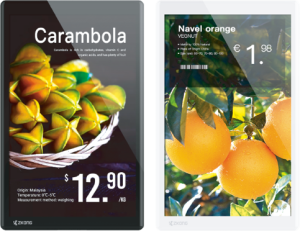In the fast-paced world of retail, staying ahead of the curve is not just an advantage; it’s a necessity. As consumer demands evolve and the retail landscape becomes increasingly competitive, businesses are turning to innovative solutions to streamline operations, enhance customer experience, and drive sales. One such innovation that is making waves across various sectors—including liquor retail, pharmacies, and independent supermarkets—is the adoption of Electronic Shelf Labels (ESLs).
The Evolution of Retail
Gone are the days when traditional paper labels sufficed for price and product information. In today’s digital age, consumers seek instant gratification and up-to-the-minute accuracy, something that paper labels simply cannot provide. Enter ESLs, a dynamic and eco-friendly solution that not only meets the modern consumer’s expectations but also offers a plethora of benefits for retailers.

Labour Savings: A Game Changer
One of the most significant advantages of implementing ESLs is the remarkable reduction in labour costs. Traditionally, updating price tags was a manual and time-consuming process, requiring significant manpower, especially for large retail outlets. With ESLs, price changes can be executed instantly and remotely, freeing up staff to focus on more critical tasks such as customer service and sales. This shift not only optimizes workforce efficiency but also contributes to a more motivated and productive team environment.
Unlocking New Marketing Opportunities
ESLs are not just about price management; they are powerful marketing tools. With the ability to update information in real-time, retailers can run flash sales, highlight promotions, or display QR codes for additional product details, all of which enhance the shopping experience and can lead to increased sales. Furthermore, the dynamic nature of ESLs allows for personalized marketing, targeting specific customer segments directly at the point of sale—a strategy that is both effective and engaging.
A Step Towards Environmental Sustainability
In an era where sustainability is a growing concern, ESLs offer an environmentally friendly alternative to paper labels. By reducing the need for paper and ink, and minimizing waste associated with frequent price changes, retailers can significantly lower their carbon footprint. This not only benefits the planet but also resonates with eco-conscious consumers, further bolstering a retailer’s brand image.
Overcoming Implementation Challenges
Despite the clear benefits, the adoption of ESLs is not without its challenges. The initial cost of implementation can be a hurdle for some businesses. However, the long-term savings in labour and printing, coupled with the potential for increased sales through dynamic marketing, make ESLs a worthwhile investment. Moreover, financing solutions are available that align with the labour savings, making the transition to ESLs more accessible for businesses of all sizes.
Real-World Success Stories
The efficacy of ESLs is not merely theoretical. Numerous outlets in the liquor space, as well as major retailers like Woolworths and Total Tools, have successfully integrated ESLs into their operations, reaping the benefits of enhanced efficiency and customer engagement. These real-world examples serve as a testament to the transformative potential of ESLs in the retail sector.
Conclusion
For liquor retail owners, pharmacists, and independent supermarket owners, the message is clear: the future of retail lies in digital transformation, and ESLs are at the forefront of this revolution. By embracing ESLs, retailers can not only streamline operations and reduce costs but also unlock new avenues for growth and customer satisfaction. As the retail landscape continues to evolve, those who adapt and innovate will undoubtedly emerge as leaders in their respective markets.
